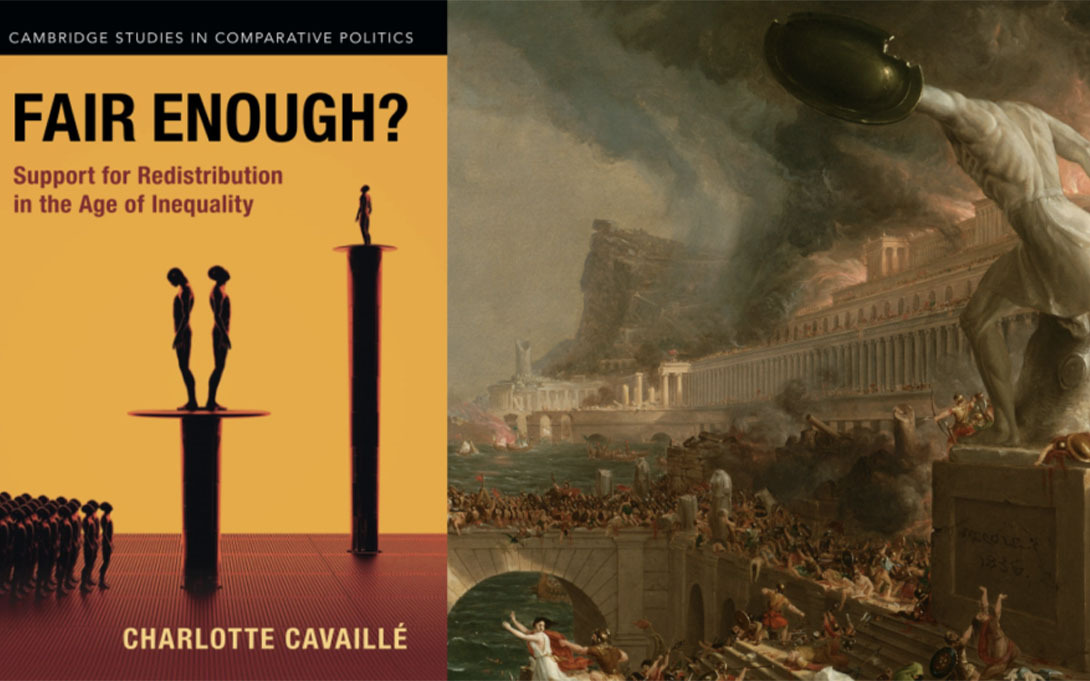
In the past, excessive economic inequality has ended… badly. As Charlotte Cavaillé points out in her new book that studies the public’s reaction to rising inequality, “only mass warfare, a state collapse, or catastrophic plagues have significantly altered the distribution of income and wealth.” Will this time be different?
Through income redistribution, democratic and political institutions today have a clear mechanism to peacefully address income inequality if voters demand it. Still, as highlighted by Cavaille in Fair Enough?: Support for Redistribution in the Age of Inequality (Cambridge University Press), greater wealth and income inequality are not leading to greater demand for an egalitarian policy response as many would expect.
Cavaillé reports there is little evidence of rising support for redistribution, especially among the worse off. Consider public opinion in the two Western countries with the sharpest increase in income inequality: In Great Britain, public support for redistribution is decreasing, and in the United States, the gap between the attitudes of low-income and high-income voters is narrowing. What, asks Cavaillé, can we conclude about public opinion’s role as a countervailing force to rising inequality?
Based on Cavaillé’s doctoral work, Fair Enough? introduces a framework for studying mass attitudes toward redistributive social policies. Cavaillé shows that these attitudes are shaped by at least two motives: material self-interest and fairness concerns. People support policies that would increase their own expected income. On the other hand, they also support policies that, if implemented, “would move the status quo closer to what is prescribed by shared norms of fairness.” Material interest comes most into play when policies have large material consequences, according to Cavaillé, but in a world of high uncertainty and low personal stakes, considerations of fairness trump considerations about one’s personal pocketbook.
How fair is it for some to make a lot more money than others? How fair is it for some to receive more benefits than they pay in taxes? Cavaillé emphasizes two norms of fairness that come into play when we think about such questions: proportionality, where rewards are proportional to effort and merit, and reciprocity, where groups provide basic security to members that cooperatively contribute. Policy disagreement arises because people hold different empirical beliefs regarding how well the status quo aligns with what these norms of fairness prescribe.
With fairness reasoning in the picture, Cavaillé writes, “baseline expectations are turned on their heads: Countries that are more likely to experience an increase in income inequality are also those least likely to interpret this growth as unfair.”
Should we expect growing support for redistribution to be a driving force behind policy change in the future? A change in aggregate fairness beliefs, Cavaillé argues, will require a perfect storm: a discursive shock that repeatedly exposes people to critiques of the status quo as unfair on the one hand, and a large subset of individuals whose own individual experience predispose them to accept these claims as true on the other. Policy changes in postindustrial democracies are possible, Cavaillé concludes– but they are unlikely to be in response to a pro-redistribution shift in public opinion.
Story originally written by Tevah Platt and Charlotte Cavaillé and published by the University of Michigan's Center for Political Studies

